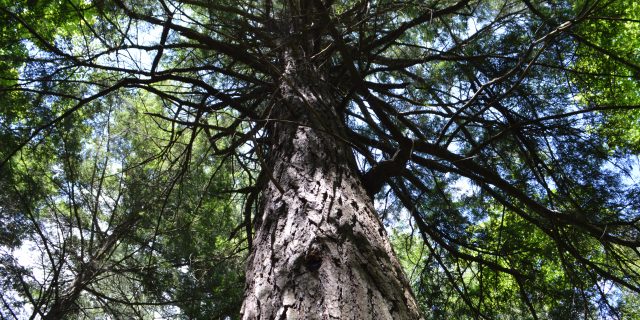
By
Ian Puppe
March 2024
Print Version
What you need to know
Growing interest in food production, food in/security, and food sovereignty is leading towards a reinvigorated interest in the unique and ancient foodways of Indigenous Peoples in the Western Hemisphere. This project combines archival and ethnohistoric research with participant observation from my work in Algonquin Provincial Park to explore the vast, diverse, and profoundly interconnected foodways of various cultures, theorizing a new approach to the anthropology of food through the concept of terroir. From the engineered clam gardens of the northwest coast to the cultivation of corn fungus/smut and the fermentation of chicha in the northern plains, central and southern Americas, to the transformation of bark bread “bannock” traditions of the woodland region, and everything in between and surrounding, Indigenous foodways were, and remain, integrated into ecosystemic surroundings through both socio-politically informed economies and philosophical means, highlighting the distinct approach to symbiotically integrating culture with nature demonstrated by Indigenous cosmologies in the Americas.
Why this research is important
This project has several objectives. It will inform the theoretical approaches taken to the exploration of contemporary efforts towards food sovereignty in Indigenous communities but also work to reshape approaches to research on foodways that position Indigenous Peoples as “part of” the environment to show how Indigenous Peoples remain actively engaged participants in kin-based relationships of mutual obligation and defenders of ancient and threatened relationships between peoples, cultures, ecologies and the sacred. Exploring the integration of foodways into the management of ecosystems, this research explores the ways that these distinct traditions illuminate ethics of world-building according to principles of reciprocity and responsibility.
How this research was conducted
Employing archival and ethnohistorical research alongside fieldwork in Algonquin Provincial Park, I work to understand the knowledge of the Algonquin Anishinaabeg and its development through relationships to the land sustained over millennia. Through over a decade of return visits to various campgrounds, trails, museums, and backcountry sites, I work to integrate my understandings of conservation biology and environmentalism with the things I learn from my interlocutors and friends, many of whom are Algonquin Anishinaabeg. Combining interviews, oral history, documentary evidence and ethno-scientific research, I hope to build bridges between distinct approaches to the world routed through the assumptions of settler-colonial capitalism and the cosmology of the Algonquin. This project required an extensive survey of existing literature and developing research, as well as listening to Indigenous experts on foodways and food sovereignty, which will inform my teaching as I hope to offer a course covering Indigenous foodways in the future.
What the researcher found
Following the work of Michael Taussig, analyses mindful of metonymy and mimesis guide many of the approaches explored in this project, from the notions of reincarnation that support Algonquin relations to old-growth white pine to the shapes of the gaps in the rocky clam gardens built to mimic the clam shell by the Coast Salish and others on the northwest coast. Metonymy, when a part is understood to represent the whole, and mimesis, the re-presentation of observed relations in conceptualizing other arrangements, are concepts with great utility in the analysis of the political ecology of Indigenous foodways. The potential for employing these concepts in relation to the logics and rationales which inform various Indigenous foodways helps to underscore the empirical observation and experimentation involved in providing long-term stability for Indigenous societies over millennia while they built sciences of their own responsive to the needs of their surroundings.
How this research can be used
The term terroir describes the unique relationships between specific soil ecologies, grapes, and the wines they produce and has allowed for the regional branding of wines in France for generations. Transporting the concept to the Americas helps inform how unique relationships develop over time through the conscious integration of culturally situated foodways with local ecologies to cultivate ecosystemic abundance. Oriented towards long-term stability, these foodways offer important counterpoints to contemporary views of humanity that assume our species to have a net negative effect on the environment. Examining how Indigenous communities support the health and well-being of the species they depend on offers opportunities to reimagine the potential reshaping of contemporary agricultural production in more-than-sustainable ways. After all, sustainability is a minimum condition.
About the Researcher
Keywords
- anthropology
- conservation
- ethnohistory
- ethnoscience
- foodways
- sustainability
- terroir
Publications Based on the Research
Puppe, I. (2021). When the bough breaks: Balancing heritage, forestry, and unsustainable standards in Algonquin Provincial Park. In J. Graham, C. Holmes, F. McDonald, & R. Darnell (Eds.), The social life of standards: Ethnographic methods for local engagement (pp. 199–218). University of British Colombia Press https://www.ubcpress.ca/the-social-life-of-standards
Editor: Christiane Ramsey
Read more BU Research
Research at Brandon University follows comprehensive policies designed to safeguard ethics, to ensure academic integrity, to protect human and animal welfare and to prevent conflicts of interest.

